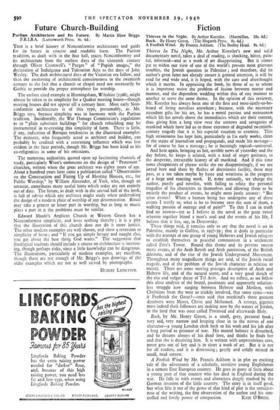Fiction
A Foolish Wind. By Francis Askham. (The Bodley Head. 8s. 6d.)
Thieves In The Night, Mr. Arthur Koestler's new and solid documentary novel, takes a deal of reading, is shocking, bitter, pain- ful, informed—and as a work of art disappointing. But it comes pat to widen our view of one of the world's present most grievous troubles, the Jewish question in Palestine ; and therefore, did its author's great fame not already ensure it general attention, it will be read far and wide and, it is hoped, with the care and afterthought which it merits. In appraising the book, let those of us to whom it is important waive the problem of fusion between matter and manner, and the dependent wedding within this of one manner to another to serve the same theme. In the opinion of this reviewer, Mr. Koestler has always been one of the first and most-justly-to-be- heard of living novelists anywhere ; because, with the necessary attendant gifts for his art, he has a moral passion and seriousness which lift his novels above the immediacies which are their content, thus giving him a long view over the sorrows and savageries of mankind which have led us to those extremes of degraded twentieth- century tragedy that it is his especial vocation to examine. This high seriousness has kept him, particularly in his early works, clean of the stains of journalism and propaganda, and made his message— for of course he has a message ; he is burningly topical—universal.
And here again, bringing us hot, terrible news of yesterday and the day before, he keeps it related, with a kind of angry patience, to the desperate, intractable history of all mankind. And if this time some cheapnesses of phrase strike the ear disappointingly, if we are jarred here and there by flashes of doctrinaire facility, these may pass, as a tax taken maybe by haste and weariness in the progress of a large and exacting work. If, more seriously, we charge the author, purely qud novelist, with failing to relate the personal tragedies of his characters to themselves and allowing them to be entirely the product of events, he might most justly answer : " But what events! When a human being has undergone any of these events I testify to, what is he to become save the sum of them, a walking passion of outrage and of pain?" To that I can in truth find no answer—yet as I believe in the novel as the great vessel wherein together blend a man's soul and the events of his life, I believe that it lies, say, in Dostoevsky.
These things said, it remains only to say that the novel is set in Palestine, mainly in Galilee, in 1937-39 ; that it deals in particular with the attempt of one group of young Hebrews and Jewish refugees to establish themselves in peaceful communism in a settlement called Ezra's Tower. Round this theme and its persons swarm many events, of the Arab Revolt and Arab patriotism, of the British dilemma, and of the rise of the Jewish Underground Movement. Throughout many magnificent things are said, of the Jewish racial tragedy, and of the problem of the Jewish character in relation to society. There are some moving passages descriptive of Arab and Hebrew life, and of the natural scene, and a very good sketch of the rise and vulgar decay of Tel Aviv. And we reflect, as we follow this close analysis of the brutal, passionate and apparently solution- less struggle now surging between Hebrew and Moslem, with Christians from the west so trickily involved, that some cynic—was it Frederick the Great?—once said that mankind's three greatest deceivers were Moses, Christ and Mohamed. A strange, gigantic mess indeed their followers are making now by the waters of Jordan, in the land that was once called Promised and afterwards Holy.
Back, by Mr. Henry Green, is a small, grey, personal book ; very sad, very narrow and keeping close in to the nerves of one character—a young London clerk back to his work and his job after a long period as prisoner of war. His mental balance is disturbed, and he dreams always of his dead love, and thinks he finds her and that she is deceiving him. It is written with unpretentious care, never gets out of key and is in short a work of art. But it is not for all readers, and it is distressing ; greyly and coldly misted in small, mad sorrow.
A Foolish Wind by Mr. Francis Askham is in plot an exciting tale of the adventures of a scholarly, sensitive young Englishman in a remote East European country. He goes in quest of facts about a young poet of that country who has died in England during the war. He falls in with events and characters deeply marked by the German invasion of the little country. The story is in itself good, but what lifts it out of the genre of that kind of plot is the sensitive- ness of the writing, the fine observation of the author and his con-
trolled and lovely power of compassion. KATE O'BRIEN.


































 Previous page
Previous page